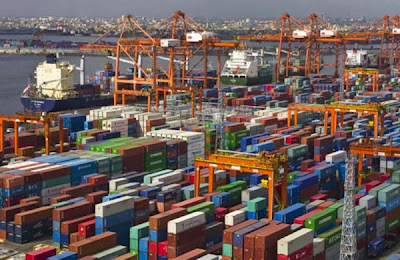PH big time rice smuggler identified
 |
| Containers at the Manila port. Credit: Marnews.net |
Previous reports claimed that David Tan was based in Davao City, which is the reason why Mayor Duterte rose up to the occasion of investigating the whereabouts of this alleged rice smuggler. Finally, Duterte showed the media the identity of the said smuggler during a press conference so that the public
may know his real identity.
Justice Secretary Leila de Lima said in a media interview that David Tan may have been operating a single rice cartel. This is the reason why the National Bureau of Investigation (NBI) is digging deeper into the case to find out more details.
Rice smuggling has become a hot issue in the Philippines, after groups of farming cooperatives have complained of sufferings due to stiff competition from rice cartels who were suspected of controlling the supply and prices of rice in the domestic markets. In fact, this resulted to locally produced rice being
sidelined by consumers because they're more expensive to buy than imported rice.
This problem is nothing knew to some officials of the Bureau of Customs (BOC). In fact, there were reports that some of them had been suspected of conniving with smugglers to short-change the government of the much-needed revenues, and collect the bribes for their own pockets.
The modus operandi is that big volumes of imported rice from Vietnam and Thailand are no longer coursed through the Manila port. Instead, the smugglers have used some of the country's remote ports, where they have close contacts with customs district collectors in exchange for huge sums of money.
In the past, it became a routine for importers to declare their goods with the Economic Intelligence and Investigation Bureau (EIIB), even after these were cleared by the Bureau of Customs. With the abolition of the EIIB, it's only the BOC that is tasked to clear imported goods without any hassle at all. That means
BOC officials and employees assigned to inspect the imported goods can do whatever they want to do with the valuation of goods.
Without any agency that can do the counter-checking as to whether the imported goods were properly examined and assessed or not could not be determined. This was the reason why there were clamors from cause-oriented organizations and the new leadership at the customs bureau to employ the latest technology as replacement to manual methods of assessing the duties of imported goods.
There were attempts in the past to computerize the valuation of imported goods but the plan was shelved for reasons unknown to the public. What aggravated the problem was that the abolition of the anti-smuggling bureau and the junking of the computerization at the customs bureau almost happened at the same time. Consequently, smuggling activities at the ports had never ceased.
The idea of privatizing the Bureau of Customs cropped up lately. But the government has to deal with the security of tenure of the regular employees at the BOC who can't just be kicked out or forced to retire for no apparent reason?


Comments